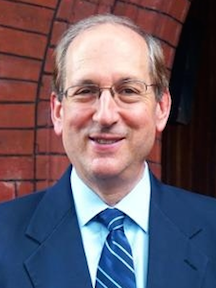Since our founding, Phi Beta Kappa has played a significant role in the national conversation. Our mission—to champion education in the liberal arts and sciences, foster freedom of thought, and recognize academic excellence—has called for us to engage with a wide range of public issues. The Phi Beta Kappa Senate captured this connection at its meeting in December 1941, declaring that our historic motto “implies that the Society has an obligation to translate the significance of liberal arts education into terms of living in a democracy.” Then as now, our mission, grounded in our founding in 1776, calls for us to meet the moment. And our moment is one of grave concern for higher education and cultural institutions.
To meet this moment, our mission—not politics—will continue to drive our nonpartisan advocacy actions. Phi Beta Kappa plays an essential role in translating the inextricable connection between vibrant liberal arts education and the needs of a thriving democracy, a connection that has provided the compass for our advocacy efforts. Historically, this has led us to support efforts to expand access to higher education (hence our role in the “Double Pell” coalition of institutions urging an increase in Pell Grants, the largest federal grant program for undergraduates) and to support efforts to enhance the national cultural endowments (hence our founding role in the National Humanities Alliance, advocating for federal support for the National Endowment for the Humanities). We consistently defend academic freedom and free expression, urging federal and state governments as well as academic institutions to support robust intellectual exchange. We remind policymakers that core academic issues, such as the curriculum structure and faculty composition, must be determined by academics applying academic standards, not politicians applying political views.
Now, we must engage with a broadened range of issues. Two examples, relevant at the time of this writing, make this point powerfully. Proposals dramatically cutting the funding formula for the National Science Foundation and the National Institutes of Health undermine American leadership in scientific inquiry and the pursuit of knowledge that benefits students on campuses across the country. Deep cuts to any part of university funding create dangerous ripple effects across the curriculum, causing widespread harm to higher education institutions, and significantly damaging the wider communities who rely upon them.
Endowments permit universities to support their research and teaching programs without having to rely excessively on tuition. As a result, university endowments are the cornerstone of research support and financial aid. Pending legislative proposals would dramatically expand the devastating effect of the federal tax on endowments by increasing the rate from 1.4 percent to the current corporate tax rate of 21 percent and increasing the number of schools to whom the tax applies. Reductions in financial aid, research support, and liberal arts courses would be the most immediate effects of such an increase in university tax levels.
Proposals to reduce support to universities or to increase their tax burden, along with other proposals such as those to reduce or even eliminate the Department of Education, implicate core issues of the Phi Beta Kappa mission. These matters will now join such concerns as support for the national culture endowments and threats to academic freedom as subjects of our nonpartisan advocacy. Each of us has a role in this work. The column “From Campus to Capitol” from the National Arts & Science Initiative, our advocacy arm, in the spring 2025 Key Reporter discusses how each ΦBK keyholder can make a difference. Follow our website, pbk.org. As opportunities for action become available, we will share these resources.
We, like Phi Beta Kappa members of prior generations, know that we have the potential and, therefore, the obligation to take actions “to translate the significance of liberal arts education into terms of living in a democracy.”
Frederick M. Lawrence
Secretary and CEO
Secretary Lawrence recently addressed the American Association of Colleges and Universities, as well as the American Council on Education and the annual Higher Education Law & Policy conference. Additionally, he has lectured on free expression, academic freedom, and the importance of liberal arts and sciences education at Indiana University, and Iowa State University. He has appeared on PBS NewsHour, CNN, and CBC and has delivered addresses at the Hertie School in Berlin and Universitá Cá Foscari Venezia in Venice. In addition to his role at the Society, Secretary Lawrence is a distinguished lecturer at the Georgetown University Law Center, where he teaches “Free Speech on Campus” and “Higher Education and the Law.” He is the author of numerous articles on the topics of free expression, free inquiry, and academic freedom, and he is a co-author of the forthcoming new edition of Higher Education and the Law, the leading casebook in the field.




